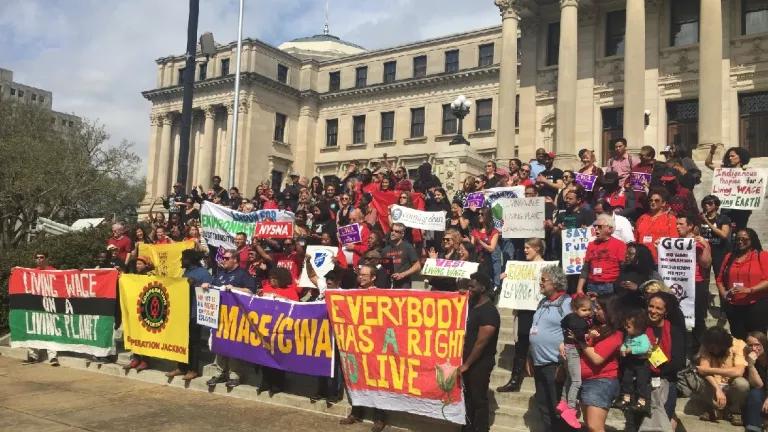Janus Ruling Harms Us All

Public sector unions, which represent nurses, teachers, firefighters, EPA employees, and other public servants, have long been strong allies in protecting our environment. On climate change these unions are the core of support from the U.S. labor movement having joined the Peoples Climate March, supported the Paris Climate Accord, and helped pass the historic AFL-CIO resolution on climate and energy issues. They are on the front lines of fixing lead contamination in drinking water across the country. They represent the workers at the EPA and environmental agencies in dozens of states that are doing the day to day work to protect our environment. And many of the largest unions are partners in the BlueGreen Alliance, a coalition of labor and environmental organizations that works every day to create “good jobs, a clean environment, and a fair and thriving economy.”
But now, due to today’s Supreme Court ruling in Janus v. American Federation of State, County and Municipal Employees Council 31 (AFSCME), public-sector unions will be under threat of having their financial resources cut out from underneath them. This outcome is what extreme conservative interests have been hoping for – as public-sector unions are one of the strongest power centers in advancing pro-worker, pro-community and pro-environment policies.
After reviewing the merits of the case and the threat posed to our labor allies and the communities they represent, NRDC joined the National Women’s Law Center and The Leadership Conference on Civil and Human Rights’ amicus brief in support of AFSCME. The Janus decision is a blow to working people’s ability to protect themselves, their communities and the planet from problems too large to solve individually. This loss is one we will all end up feeling.
The issue in the Janus case is that public sector unions are required to collectively bargain for all employees, whether those employees belong to the union or not. In some states these non-members are required to pay a ‘fair-share’ fee, which covers the cost of representing them in the collective bargaining from which they benefit, but doesn’t send money into political activities which that employee may not agree with.
For the last 41 years this arrangement has allowed fair representation without making individuals support political views they oppose, but now the Court has decided that even paying ‘fair share’ fees constitutes an infringement of First Amendment rights. This means unions will still have all the required work to represent non-members, but not be reimbursed for it. It’s a recipe to severely harm their financial health, their ability to represent everyone in the workplace and their ability to work on public policy.
On average, a worker covered by a union contract earns 13.2 percent more in wages than a peer with similar education, occupation, and experience in a nonunionized workplace in the same sector. Beyond this, public sector unions are also key to fighting the some of the inequities facing historically disadvantaged people as women and African Americans have historically been a larger percentage of public employees at state and local levels than they make up in the population as a whole.
According to the amicus brief NRDC signed, “A wealth of data shows that women and people of color who are represented by unions …. enjoy greater pay equity and increased benefits like health insurance and parental leave, have safer workplaces, and have access to additional avenues for civil rights protections than their non-union counterparts.”
As NRDC president Rhea Suh has stated, we know that “Women, low-income communities and people of color frequently bear the heaviest burdens from climate change and industrial pollution. These communities face a greater risk of getting sick, losing their livelihoods, living in poverty, and being displaced when weather disasters strike.” NRDC is deeply concerned by the inequity of environmental harms, and economic inequity is one of the root causes of that problem, so we stand with those who are protecting those who face the greatest threats.
The Janus decision is a serious challenge for public sector unions, but don’t count them out yet. In this moment when our Union sisters and brothers are under attack, we stand in solidarity with them in the fight for a more just and sustainable future.
